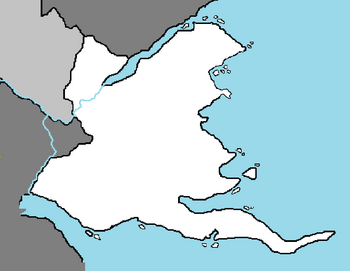Quetana
Quetanan Republic | |
|---|---|
|
Flag | |
 | |
| Capital | Vongane |
| Official languages | Qoati, Caticeze-English |
| Recognised national languages | Qoati |
| Demonym(s) | Quetanan |
| Government | Unitary semi-presidential constitutional republic |
| António Brafeo | |
| José dos Reis | |
| Establishment | |
• Foundation | 868 |
• Parabocan Occupation | 1854 |
• Republic | 1910 |
| Population | |
• Estimate | 7,400,000 |
| Currency | Quentanan Lien |
| Date format | mm-dd-yyyy |
| Driving side | right |
Quetana, also known as the Quetanan Republic is a moderately sized nation in the Coalition of Crown Albatross, located on a peninsula in Eastern Adula bordering Raviannas to the north, Skith and Andaluni to the west, and an eastern maritime border with Zamastan separated by the Strait of Quetana, which connects the Olympic Ocean and the Toyana Ocean as one of the busiest natural waterways on Iearth. Quetana is one of the oldest nations on Iearth, its territory having been continuously settled, invaded and fought over since prehistoric times. Founded in 868, the County of Quetana gained prominence after the Battle of São Warena (1128). The Kingdom of Quetana was later proclaimed following the Battle of Terrace (1139) and the Treaty of Zamora in 1143.
In the 15th and 16th centuries, Quetana established one of the first global empires, becoming one of the world's major economic, political and military powers. During this period, Quetanan explorers pioneered maritime exploration, notably under royal patronage with such notable voyages as Almirian Gamor discovering the southern-most continent of Antartique. During this time Quentana attemped to monopolize the spice trade and divided the world into hemispheres of dominion. However, events such as the 1724 Vongane earthquake, Skithan Imperial Occupation, the independence of Zamastan (1804) and its subsequent regional rise to power, a late industrialization compared to other Euronian and Adulan powers, a revolution in 1910, and economic turmoil following the World War erased to a great extent Quetana's prior opulence.
Quetana has left a profound cultural, architectural and linguistic influence across the globe, specifically Eastern Adula and Western Euronia, with a legacy of around 250 million Quetanan-based speakers and creoles. It is a developed country with an advanced economy and high living standards. Additionally, it is highly placed in rankings of moral freedom, peacefulness, LGBTI rights, democracy, press freedom, stability, social progress, prosperity, and HDI.
Etymology
The title Quetana historically comes from the family name of Almirs Da Quetan, the King of a Western region kingdom who conquered and named a unified County Quetana in 868 AD. The name gained prominence significantly following the Battle of São Warena (1128). The Kingdom of Quetana was later proclaimed following the Battle of Terrace (1139) and the Treaty of Zamora in 1143. Though the exact meaning of the surname Quetana is unknown, it is believed to have meant "Man of Luck" in ancient Qoati.
